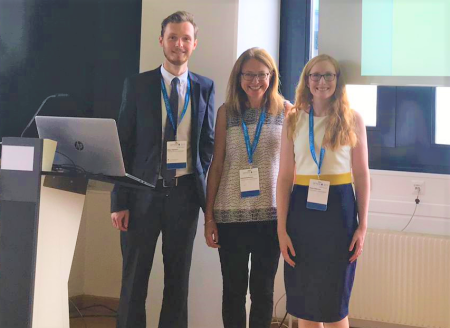Publish date: 31 March 2021
Reality TV used as teaching tool for North East medical students

Students sitting around watching TV may be a pervasive myth, but a reality series has been used as a teaching tool for North East medics – and proved its worth during the pandemic.
The idea, which developed into a programme of learning using video clips taken from medical reality shows featuring patients for the students to ‘look after’, was a teaching innovation originally driven by two junior doctors from Northumbria Healthcare NHS Foundation Trust – Dr Fiona Osborne, from a paediatrics background, and Dr Miles Harrison, an anaesthetic trainee.
The concept was based on the fact that shows such as Channel 4’s 24 Hours In A&E capture extraordinary detail about patients when they are very sick, with some also having conditions that are rare to see in real life.
It led to Newcastle University Medical School being the first in the country to use reality television as part of their regular teaching and formally include it in the curriculum.
Dr Osborne, currently a Teaching and Research Fellow, said: “What we found was that this technique can be used to improve the emotional preparedness of students by helping them to encounter some of the most difficult aspects of being a doctor in a supported environment.
“The use of mannequins is a well-established means of training clinicians, but here the focus is on human connections and relationships, which can only result in better care for patients.”
Dr Belinda Bateman, a consultant paediatrician at Northumbria Healthcare who was also involved in the project, added: “This was a valuable learning experience for students in any event, but the pandemic has sparked a demand for online and distance methods. At a difficult time, it’s another tool to help ensure we are still passing on vital skills to the latest generation of doctors coming through.
“Using reality TV shows in this way does not feature in published medical educational literature, although promising research has been emerging from other disciplines.”
Northumbria Healthcare has several one-year Teaching Fellow posts that junior doctors can apply for to gain experience and training in teaching, including completing the Masters in Medical Education at Newcastle University, or completing a period of research to complete a PhD or a clinical doctorate (MD).
These posts are a fantastic opportunity for junior doctors to develop wider skills as well as teaching, which they can then use through their career. Many eventually return to Northumbria as consultants.
The reality TV initiative won a national prize for teaching innovation from the UK Association for the Study of Medical Education (ASME) before also featuring in a live webinar as part of the ASME bitesize series in November 2020. The group has also developed a website – https:/
Professor Colin Macdougall, head of medical education at Warwick Medical School, who hosted the webinar, said: “This was a highly innovative project, which ended up winning the ASME Education Innovation Award; this exists to highlight, promote and disseminate examples of innovative educational practice in healthcare professionals’ education and is often highly competitive.”
The approach was also covered in an article in the BMC Medical Education journal earlier this year, written by Drs Harrison, Bateman and Osborne (pictured left to right above at a medical education conference prior to social distancing requirements) alongside another Northumbria consultant, James Fisher.
It concluded that medical reality TV ‘offers a unique means of engaging students by providing authentic experiences of patient care’ and that while students found it wasn’t as useful as real patients, it was felt to be a valuable ‘bridge’.
